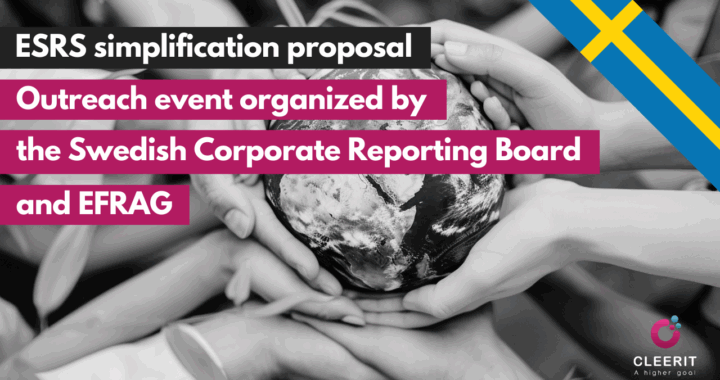Monday 22/9, the Swedish Corporate Reporting Board hosted an outreach event with EFRAG to gather feedback on the ESRS simplification proposal. Approximately 50 people participated online, whereof a handful asked questions and/or gave feedback.
The goal was twofold: to clarify the upcoming changes and ensure Swedish stakeholders’ perspectives are heard.
Here are some key takeaways:
Overall, the Confederation of Swedish Enterprises (Svenskt Näringsliv) recognized EFRAG’s work as “a good step in the right direction”.
Insurance Sweden (Svensk Försäkring) shared that opinion but added that they were disappointed that the simplification did not go further, as “the weight of the datapoints is more important than the number”. They also expressed that although clarified, “DMA is still overly complex” and “should be more principle based”.
Insurance Sweden expressed support for the fair presentation concept, but in their opinion the current wording risks introducing a compliance mindset. Wording such as “information necessary for” is difficult to appreciate.
They also pointed out that auditors in different countries have different views. The fair presentation provision “is not a concern in Sweden but in the South of Europe it seems to be”. They suggested clarifying the wording to stress “the overarching principle-based framework to avoid information overload”.
The Confederation of Swedish Enterprises added that “it is the management’s view of fair presentation that is important”, depending on their stakeholders.
There was also a suggestion not to publish a non-mandatory implementation (NMIG) at all and “leave it up to the market” to determine practices, as larger companies will lead the way.
The gross vs net issue does not seem to be a big issue in Sweden. The need to preserve comparability was stressed, with the suggestion to keep just one mandatory method, gross evaluation with an option for net evaluation, and move the appendix C to the non-mandatory implementation guidance (NMIG). “Verifying remaining impacts is difficult, and it is challenging to define when a net approach is appropriate.”
Regarding the two options for disclosure of anticipated financial effects, the Confederation of Swedish Enterprises prefer option 2 (only qualitative) over option 1 (qualitative/quantitative), but “option 3 to remove financial evaluation of risks and opportunities altogether” (both qualitative and quantitative) is their most preferred option “from a reliability point of view”.
Insurance Sweden also prefer option 2 with only qualitative information, stating that “it is more balanced and realistic” as it recognizes “practical and legal risks” as well as audit complexities. Sensitive data is particular difficult to report and can give a false impression. To ensure interoperability with IFRS-SS, financial data could be subject to voluntary disclosure.
